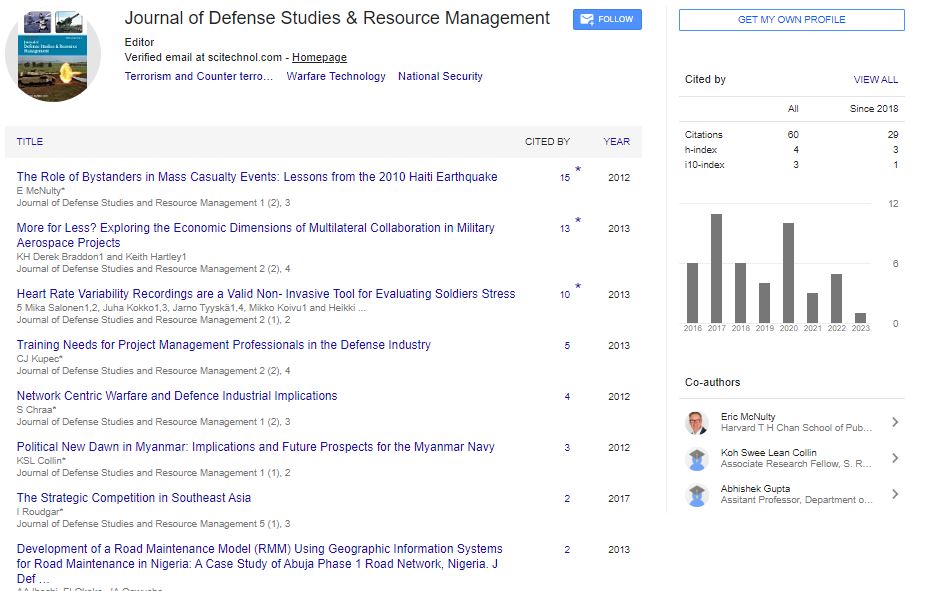Perspective, J Def Stud Resour Manage Vol: 11 Issue: 1
The Role of Military Culture in Organizational Performance
Hoku Juri*
1Department of Business Administration, Hokkaido University, Sapporo, Japan
*Corresponding Author: Hoku Juri
Department of Business Administration,
Hokkaido University, Sapporo, Japan
E-mail: hoku@juris.ac.jp
Received date: 01 March, 2023, Manuscript No. JDSRM-23-93375;
Editor assigned date: 03 March, 2023, Pre QC No. JDSRM-23-93375(PQ);
Reviewed date: 17 March, 2023, QC No. JDSRM-23-93375;
Revised date: 24 March, 2023, Manuscript No. JDSRM-23-93375(R);
Published date: 31 March, 2023, DOI: 10.4172/2324-9315.1000165
Citation: Juri H (2023) The Role of Military Culture in Organizational Performance. J Plant Physiol Pathol 11:2.
Description
Military culture is an integral part of any military organization, and it plays a vital role in determining the performance of the organization. The values, beliefs, and traditions that define military culture are deeply ingrained in the military organization and shape the behavior of its members. This article will explore the role of military culture in organizational performance, including how it affects leadership, motivation, and decision-making.
Military culture is a crucial factor in determining the performance of military organizations. The culture of an organization defines its values, beliefs, and traditions, and shapes the behavior of its members. Military culture emphasizes discipline, teamwork, and a strong sense of duty, which are all essential qualities for effective military operations.
Leadership is an essential component of military culture, and it plays a vital role in organizational performance. Military leaders must possess the qualities of discipline, selflessness, and a strong sense of duty to lead effectively. These values are instilled in military personnel from the beginning of their training, and they are reinforced throughout their careers.
Military leaders are expected to lead by example, and they are held to high standards of behavior and performance. They must be able to motivate and inspire their troops to perform at their best, even in the face of adversity. Effective military leaders are respected and admired by their subordinates, and they create a culture of excellence that drives organizational performance.
This also plays a vital role in motivating military personnel to perform at their best. The culture of discipline, selflessness, and a strong sense of duty provides a sense of purpose and commitment among military personnel. This sense of purpose and commitment is essential in motivating military personnel to overcome adversity and achieve their goals.
Military culture also emphasizes the importance of teamwork, which is vital in military operations. Military personnel are trained to work together as a team, and they are expected to support and look out for each other. This culture of teamwork causes a strong sense of camaraderie among military personnel, which is a powerful motivator in military operations.
This also plays a vital role in decision-making in military organizations. The culture of discipline and a strong sense of duty causes a framework for decision-making that emphasizes the importance of mission accomplishment and the safety and well-being of military personnel.
Military personnel are trained to make decisions quickly and effectively in high-pressure situations. They are taught to evaluate the risks and benefits of different courses of action and to make decisions that are in the best interests of the mission and the safety of their fellow military personnel.
This plays a vital role in determining the performance of military organizations. The values, beliefs, and traditions that define military culture shape the behavior of military personnel and provides a culture of excellence that drives organizational performance. Military culture emphasizes the importance of leadership, motivation, and decisionmaking, which are all essential components of effective military operations. By fostering a strong military culture, military organizations can achieve their goals and objectives and maintain their effectiveness in an ever-changing world.
 Spanish
Spanish  Chinese
Chinese  Russian
Russian  German
German  French
French  Japanese
Japanese  Portuguese
Portuguese  Hindi
Hindi 